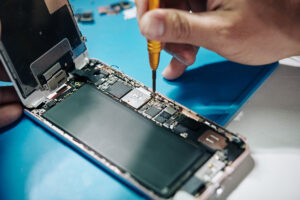
New York legislates right to repair information for digital electronic products
By onBusiness Practices | Legal
New York has become the first state to legislate the right for owners and independent repairers to have access to digital electronic product diagnostic, repair, and maintenance procedures.
Though the action doesn’t directly affect the collision repair industry, and specifically excludes automotive manufacturers, The Repair Association Executive Director Gay Gordon-Byrne told Repairer Driven News the Digital Fair Repair Act could be helpful for repairers who want to fix vehicle electronics themselves in the future. The organization wrote and backed the passage of the bill.
“The intent was always to make sure that you could always repair your stuff, even if it happened to have a computer chip in it,” Gordon-Byrne said. “So the scope is actually very broad because these days there’s computer chips in flashlights; there’s computer chips in everything. …We’re kind of pulling ahead with some other issues the auto industry didn’t deal with in the MOU; not just wireless diagnostics but some of the parts availability.”
The MOU she referenced was signed by automaker representatives and the aftermarket industry in 2014 to safeguard independent shops’ access to OEM repair and maintenance information.
Vehicles aren’t included in the legislation. In reference to wanted data access in the automotive industry under the guise of “right to repair,” the Alliance for Automotive Innovation (AAI) states in a memo that, “Automotive right to repair already exists and always will. …Automakers agree and support numerous initiatives to facilitate seamless independent auto service and repair.”
The right to repair has also been under debate in the agriculture industry. John Deere recently signed a memorandum of understanding (MOU) with the American Farm Bureau Federation that gives farmers and independent mechanics access to their diagnostic tools and information. It’s similar to the automaker and aftermarket MOU. However, the Deere MOU requires OEM tools and information tools to be purchased whereas many automakers provide information for free.
“It’s worth noting: both the New York right to repair law and the John Deere MOU are modeled after the national agreement the auto industry and the repair community adopted almost a decade ago — an agreement that is working by guaranteeing consumers and independent repairers access to the same vehicle repair and diagnostic information provided to auto dealers,” said Wayne Weikel, AAI state affairs senior director. “That’s a positive step in our view.”
Gordon-Byrne said the bill signed into law by New York Gov. Kathy Hochul “bears little resemblance to the original bill” after going through the approval process.
“It’s going to take a while for it [law] to cover everything,” Gordon-Byrne said. “The changes… that the governor wanted to have made really limited the scope of the bill… and only those that are sold to consumers. So, now a business buyer, it’s very unclear how this is going to work out. …it’s very vague so we expect there’s going to be some clarifications needed on that but it’s definitely going to make it a lot easier for a small business. …the small business will be able to buy the parts and tools and diagnostics that they need, which is a big change because right now they can’t.”
The act applies to “any product with a value over ten dollars… that depends for its functioning, in whole or in part, on digital electronics embedded in or attached to the product.”
It also requires, effective July 1, that any information needed for diagnostic scanning, repairs, or maintenance be made available for free by OEMs to equipment owners and independent repairers. Parts and tools will also have to be available to owners and independent repairers.
Hochul’s office touted the act as the first in the nation “to guarantee the right to repair, protecting consumers from anticompetitive efforts to limit repair.”
“As technology and smart devices become increasingly essential to our daily lives, consumers should be able to easily fix the devices they rely on in a timely fashion,” Hochul said. “This legislation will empower consumers with better options to repair their devices, thereby maximizing the lifespan of their devices, saving money, and reducing electronic waste.”
In Europe, the issue is seemingly addressed more clearly as seeking access to in-vehicle data, functions, and resources by the Independent Service Providers Group for the automotive and mobility services sector market as a whole, according to a letter penned by the group and supported by several other organizations to the European Commission.
However, the request for in-vehicle data may not always be for the same objective as accomplishing the “right to repair,” which is how the argument has been framed in the U.S.
“We are writing to you to urge that the Commission take swift action on the long-promised regulation that will create the conditions for competition in the data-driven automotive and mobility sectors for the benefit of European consumers and businesses,” the letter states. “Almost every European citizen uses some form of mobility on a daily basis and should therefore enjoy the benefits of data-driven innovation, choice and affordability in the automotive and mobility ecosystem. This can only happen provided the right regulatory framework is in place.”
Images
Featured image credit: DragonImages/iStock
More information
Maine coalition moves closer to ‘right to repair’ referendum
